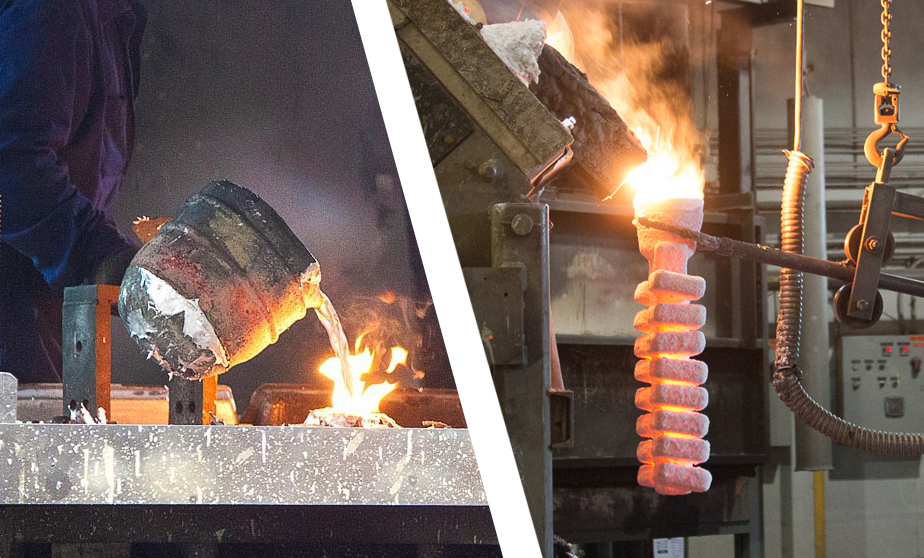9 Easy Facts About Alcast Company Explained
9 Easy Facts About Alcast Company Explained
Blog Article
The Ultimate Guide To Alcast Company
Table of ContentsAlcast Company for DummiesGet This Report on Alcast CompanyFacts About Alcast Company RevealedNot known Facts About Alcast CompanyThe 4-Minute Rule for Alcast CompanyThings about Alcast Company
The refined distinction exists in the chemical material. Chemical Comparison of Cast Light weight aluminum Alloys Silicon promotes castability by minimizing the alloy's melting temperature and improving fluidness throughout casting. It plays a critical function in enabling detailed molds to be filled up properly. Furthermore, silicon adds to the alloy's toughness and put on resistance, making it beneficial in applications where sturdiness is crucial, such as vehicle components and engine parts.It likewise enhances the machinability of the alloy, making it simpler to process right into completed products. In this means, iron adds to the general workability of aluminum alloys.
Manganese adds to the toughness of light weight aluminum alloys and improves workability (Aluminum Casting). It is commonly utilized in functioned aluminum items like sheets, extrusions, and profiles. The visibility of manganese help in the alloy's formability and resistance to cracking throughout fabrication procedures. Magnesium is a light-weight component that supplies toughness and effect resistance to aluminum alloys.
A Biased View of Alcast Company
It enables the manufacturing of lightweight elements with excellent mechanical homes. Zinc boosts the castability of light weight aluminum alloys and assists control the solidification process during spreading. It boosts the alloy's strength and firmness. It is usually found in applications where elaborate forms and great details are required, such as attractive castings and specific vehicle components.

The main thermal conductivity, tensile stamina, yield strength, and elongation differ. Among the above alloys, A356 has the greatest thermal conductivity, and A380 and ADC12 have the least expensive.
Not known Details About Alcast Company

In accuracy casting, 6063 is appropriate for applications where elaborate geometries and high-quality surface coatings are critical. Instances include telecommunication rooms, where the alloy's premium formability enables smooth and aesthetically pleasing styles while maintaining architectural integrity. In the Illumination Solutions sector, precision-cast 6063 components produce classy and efficient illumination components that call for intricate shapes and great thermal performance.
The A360 exhibits superior elongation, making it perfect for complicated and thin-walled components. In precision casting applications, A360 is fit for sectors such as Customer Electronics, Telecommunication, and Power Devices.
Getting My Alcast Company To Work
Its unique residential or commercial properties make A360 a beneficial choice for precision spreading in these sectors, enhancing item resilience and quality. aluminum casting manufacturer. Light weight aluminum alloy 380, or A380, is an extensively made use of spreading alloy with a number of unique qualities.
In precision spreading, aluminum 413 shines in the Consumer Electronics and Power Tools sectors. It's frequently utilized to craft complex elements like mobile phone housings, camera bodies, and power tool casings. Its precision is amazing, with tight tolerances approximately 0.01 mm, guaranteeing perfect item assembly. This alloy's exceptional corrosion resistance makes it an outstanding option for outdoor applications, ensuring long-lasting, durable items in the stated markets.
The 4-Minute Rule for Alcast Company
The light weight aluminum alloy you choose will considerably affect both the spreading process and the buildings of the final item. Because of this, you should make your decision carefully and take an enlightened approach.
Determining one of the most appropriate light discover this weight aluminum alloy for your application will certainly suggest weighing a vast array of qualities. These comparative alloy qualities comply with the North American Die Casting Association's guidelines, and we've split them right into 2 classifications. The very first classification addresses alloy attributes that impact the production procedure. The second covers attributes influencing the residential properties of the end product.
Get This Report on Alcast Company
The alloy you select for die spreading directly influences a number of aspects of the spreading process, like how simple the alloy is to work with and if it is vulnerable to casting flaws. Hot breaking, also called solidification cracking, is a regular die spreading problem for aluminum alloys that can cause inner or surface-level rips or cracks.
Certain aluminum alloys are extra vulnerable to warm cracking than others, and your choice needs to consider this. One more usual problem discovered in the die spreading of light weight aluminum is die soldering, which is when the actors sticks to the die wall surfaces and makes ejection tough. It can damage both the actors and the die, so you should try to find alloys with high anti-soldering properties.
Corrosion resistance, which is currently a noteworthy feature of aluminum, can vary significantly from alloy to alloy and is an essential characteristic to consider depending on the environmental conditions your product will be exposed to (aluminum foundry). Put on resistance is an additional residential or commercial property frequently looked for in light weight aluminum products and can distinguish some alloys
Report this page